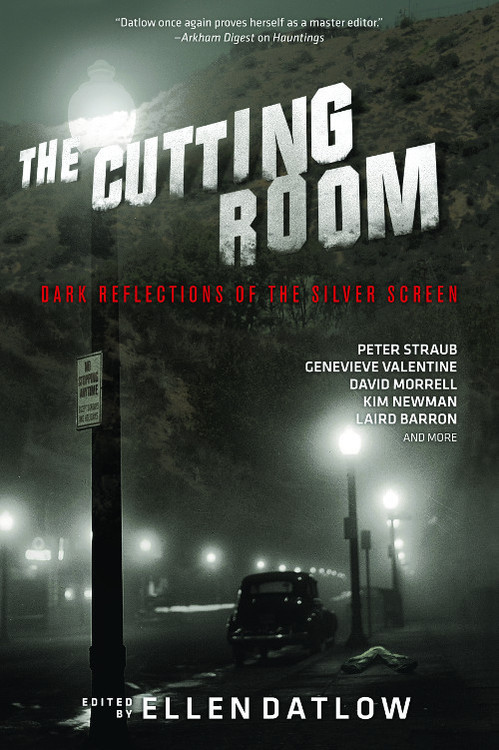THE CUTTING ROOM coming attraction: “Lapland, or Film Noir” by Peter Straub

Over the next two weeks, in celebration of Halloween and the new anthology The Cutting Room: Dark Reflections of the Silver Screen, Tachyon and editor Ellen Datlow present excerpts from a selection of the volume’s horrifying tales.
Today’s selection comes from “Lapland, or Film Noir” by Peter Straub.
A GENERAL INTRODUCTION
Our initial purpose is to discuss the effect, the feeling tone of headlights reflected on wet urban streets in Lapland, Florida. This is central to our discourse, the feeling tone of those reflections. By implication, then, rain; cars veering at great speed around sharp corners; unholstered pistols, brandished; desperate men; a sick, thrilled sense of impendingness. The immediate historical context plays a central role, as does a profound national sense of the shameful, the squalid, matters never acknowledged in the golden but streaky Florida light. You’d need a spotlight and a truncheon to beat it out of these people. Florida, it will be remembered, tends toward the hot, the dark, the needy, the rotting, the “sultry.” The stunted and unnatural. Lapland, i.e., someone’s (theoretically) warm yet not really comfortable, in fact impossibly dispossessing….
Steam rises through the grates.
We are in…………………………………………………………………………………………………………gulf coast………………………………………………………………………………………………..sempiternal darkness………………………………………………………without surcease, without hope for Silky’s………………….
In Lapland, all the women are always awake. Even your mother lies awake all the night through, drawing essential feminine nourishment from the bottomless communal well. Headlights shine in long streaks on the rain-soaked streets. Just outside the city limits, a gas station attendant named Bud Forrester rolls on his side in bed, thinking of a woman named Carole Chandler. Carole Chandler is his boss’s wife, and she has no conscience whatsoever. Bud does possess a conscience, rudimentary though it is. He wishes he could amputate it, without pain, like a sixth finger no thicker around than a twig. In Bud Forrester’s past lies a tremendous crime for which his simple duties at the gas station represent a conscious and ongoing penance.
During the commission of the crime, Frank Bigelow took two rounds in the gut, and he will never again void his bowels without whimpering, cursing, sweating. He walks with a limp, Frank. He isn’t the kind of guy who can accept stuff like the whimpering, the sweating, the limping with every step of his beautifully shod feet. And when everything depended on where the money was, the money was lifting and blowing all across the tarmac, jittering through the air, like leaves, falling earthward in zigzags, like leaves. Bud Forrester always had a little tingle of a premonition that it was going to end this way. The other guys, they didn’t want to hear about it. Bradford Galt and Tom Jardine, Bigelow had them hypnotized, in thrall. If Bud had tried to tell them about his little tingle, Galt and Jardine would have taped his mouth shut, bound his arms and legs, and locked him in a closet. That’s the way these boys operate—on only a couple of very simple levels.
Frank Bigelow, though, is another matter. One night, over a lamplit table littered with charts and maps, he had observed a certain shine in the whites of Bud’s eyes, and immediately he had known of his underling’s traitorous misgivings.
One more detail, essential to the coils of the plot: Frank Bigelow also thinks endlessly and without………upon Carole Chandler. These thoughts, alas, have darkened since he wound up impotent. Deep in his heart what he’d like to do is sic Tom Jardine on Carole; brutal, stupid Jardine is hung like a stallion (off-camera, the guy is always inventing excuses for showing off his tool) and while Tom makes Carole Chandler beg for more like the bitch she is, Frank would like to be watching through a kind of peephole arrangement. Trouble is, after that he would have to murder Tom Jardine, and Tom is one of his main guys, he’s like one of the family, so that’s out.
Every film noir has one impossible plot convenience: in this instance, despite his frustrated passion for wicked Carole Chandler, Frank Bigelow has no idea that Bud Forrester is employed at her husband’s Shell station, because he sees her only at the Black Swan, the gambling club of which he is part-owner with Nicky Drake, a smooth, smooth operator. In Lapland, one always finds gambling clubs; also, drunken or corrupt night watchmen; a negligee; a ditch; a running man; a number of raincoats and hats; a man named “Johnny”; a man named “Doc,” sometimes varied to “Dad”; an alcoholic; a penthouse; a beach shack; a tavern full of dumbbells; an armored car; a racetrack; a…………; a shadowy staircase. These elements commonly participate in and enhance the effect of headlights reflected on wet urban streets.
For information on The Cutting Room: Dark Reflections of the SilverScreen, visit the Tachyon page.
Cover by Josh Beatman.
